

Beginners Guide to Marxism by Marxists Internet Archive 2009. Marxists Internet Archive Beginners Guide to Marxism This page is intended for people looking into Marxism for the first time, and is not intended as a substitute for a thorough study of Marxist writings, biographies and group discussions.
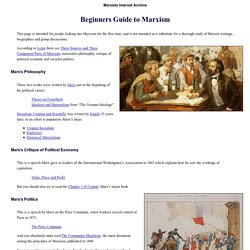
According to Lenin there are Three Sources and Three Component Parts of Marxism: materialist philosophy, critique of political economy and socialist politics. Marx’s Philosophy. Wage Labour and Capital. Works of Karl Marx 1847 Wage Labour and Capital Delivered: December 1847;Source: Wage Labour and Capital, the original 1891 pamphlet;Edited/Translated: Frederick Engels;First Published (in German): Neue Rheinische Zeitung, April 5-8 and 11, 1849;Online Version: Marx/Engels Internet Archive (marxists.org) 1993, 1999;Transcription/Markup: Zodiac and Brian Baggins;Proofed: and corrected by Alek Blain, 2006.
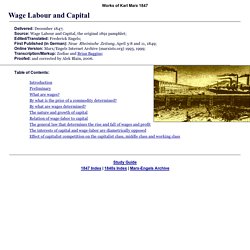
Table of Contents: IntroductionPreliminaryWhat are wages? By what is the price of a commodity determined? Study Guide1847 Index | 1840s Index | Marx-Engels Archive. Society of the Spectacle. Guy Debord 1967 Written: 1967;Translation: Black & Red, 1977;Transcription/HTML Markup: Greg Adargo.
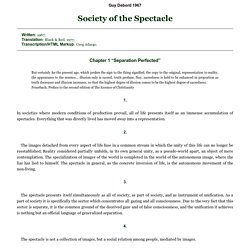
Chapter 1 “Separation Perfected” But certainly for the present age, which prefers the sign to the thing signified, the copy to the original, representation to reality, the appearance to the essence... illusion only is sacred, truth profane. Nay, sacredness is held to be enhanced in proportion as truth decreases and illusion increases, so that the highest degree of illusion comes to be the highest degree of sacredness. Encyclopedia of anti-Revisionism On-Line. BACKGROUNDA Brief definition of Anti-RevisionismRepresentative Anti-Revisionist Materials from AlbaniaRepresentative Anti-Revisionist Materials from ChinaINFORMATION ON AND PRIMARY DOCUMENTS FROM ANTI-REVISIONIST MOVEMENTS, ORGANIZATIONS AND PARTIES BY COUNTRYUnited States Alphabetical Index to All Subsections in the U.S.
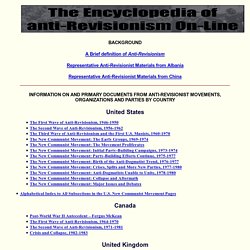
New Communist Movement PagesCanadaUnited Kingdom List of Anti-Revisionist Periodicals, Magazines and Newspapers by Country. History of the Communist Party of the Soviet Union (Bolsheviks) First Published: 1939 Publisher: International Publishers, New York Transcription/Markup: Salil Sen and Brian Reid for MIA, 2008 Public Domain: Marxists Internet Archive (2008).
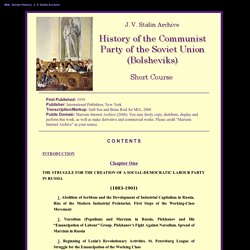
You may freely copy, distribute, display and perform this work; as well as make derivative and commercial works. Please credit “Marxists Internet Archive” as your source. Chapter One 1. Eurocommunism. Eurocommunism was a current among the Communist Parties, mainly in Europe, from 1968 up to the early 1980s, which sought autonomy of their own national parties relative to the leadership claims of the Soviet and Chinese parties or each other, being particularly critical of the lack of internal democracy in the Communist movement.
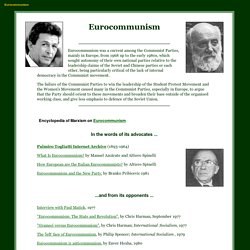
The failure of the Communist Parties to win the leadership of the Student Protest Movement and the Women's Movement caused many in the Communist Parties, especially in Europe, to argue that the Party should orient to these movements and broaden their base outside of the organised working class, and give less emphasis to defence of the Soviet Union. Encyclopedia of Marxism on Eurocommunism In the words of its advocates ... Palmiro Togliatti Internet Archive (1893-1964) What Is Eurocommunism? How European are the Italian Eurocommunists? Marxist Humanism. An index to the writings and biographies of Marxist-Humanist writers.
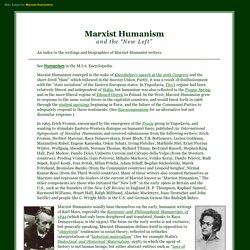
See Humanism in the M.I.A. Encyclopedia. History Archive. Documents on the Russian Revolution. General Overview: In 1917 Russia went through two revolutions: February 24 - 29 and October 24 - 25.

The first revolution overthrew the tsarist government and replaced it with a Provisional Government of Duma members (mostly members of the Cadet party), who allowed a Contact Commission of the Petrograd Soviet to advise the government. Protests and strikes against the new government quickly grew as Russia's involvement in World War I lingered on, and the Provisional Government responded by establishing a Coalition Government with the Executive Committee of the Petrograd Soviet. This Dual Power however, created a confused bureaucratic quagmire, leading the government to inaction on urgent issues such as the widespread famine and slaughter on the front. Such crisis resulted in opportunities for some to seize autocratic power, as Kerensky and General Kornilov attempted.
Paris Commune Government. Documents of the Paris Commune.
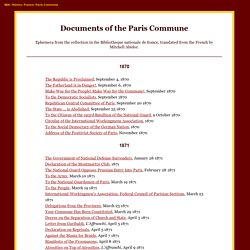
History of the Communist International. Introduction Founding of the Communist International, Arthur Ransome 1919 Writings of the Early Comintern The Communist International: Organ of the E.C.C.I.
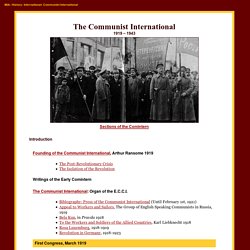
First Congress, March 1919. Left-Wing Communism Subject Archive. Left-Wing, Anti-Bolshevik and Council Communism Index to the works of “Left Communists” (a.k.a. “Council Communists” or “Anti-Bolshevik Communists”) and other ultra-left Communist currents and the debates between Left Communists and the leaders of the Comintern and each other. Introductions: First introductions for beginners could be: 1991: Revolutionary Traditions - Council Communism by Steve Wright 1999: Council Communism, by Neil Fettes Some more elaborating introductions are: 1978: Council Communism by Richard Gombin 1987: Council Communism by Mark Shipway 2004: On Council Communism, by Marcel van der Linden.
Economic Manuscripts: Value, Price and Profit, Karl Marx 1865. Socialism: Utopian and Scientific. Works of Peter Kropotkin. THE COMINTERN HAS LONG CEASED TO MEDDLE IN OUR INTERNAL AFFAIRS. COMBAT LIBERALISM. Chinese Communism. International Revolutionary Organisation. History of The First International by G. M. Stekloff. G. M. Stekloff 1928 First published: in England 1928. Published: London. Martin Lawrence Limited;Translated: from the 3rd Russian edition, with notes from the 4th edition, by Eden and Cedar Paul;Printed: and made in England by the Dorrit Press, Ltd, London S.E.1. “It is not ... a mere improvement that is contemplated, but nothing less than a regeneration, and that not of one nation only, but of mankind.
History of the Second International. The Third International and Its Place in History. Written: 15 April, 1919 First Published: Published in May 1919; Published according to the manuscript. Source: Lenin’s Collected Works, 4th English Edition, Progress Publishers, Moscow, 1972 Volume 29, pages 305-313 Translated: George Hanna Transcription/HTML Markup: David Walters & Robert Cymbala Copyleft: V. I. Lenin Internet Archive (www.marx.org) 2002; Permission is granted to copy and/or distribute this document under the terms of the GNU Free Documentation License. The imperialists of the Entente countries are blockading Russia in an effort to cut off the Soviet Republic, as a seat of infection, from the capitalist world. These people, who boast about their “democratic” institutions, are so blinded by their hatred of the Soviet Republic that they do not see how ridiculous they are making themselves.
For this we express our most respectful thanks to the principal organ of the French bourgeoisie, to this leader of French chauvinism and imperialism. And so it has. Soviet? Toward A History Of The Fourth International. Toward a History of the Fourth International | ETOL Home Page. Leon Trotsky: The Revolution Betrayed (1936)
The Bolsheviks. Index to the biographies and writings of members of the Party that made the October 1917 Revolution in Russia. See History Archive of Soviet Union, with the The Russian Revolution of October 1917 including eye-witness accounts and contemporary analyses. See The Bolshevik Party in the M.I.A. Encyclopedia. Stalin's Place in History. Critique of the Gotha Programme. Karl Marx 1875.